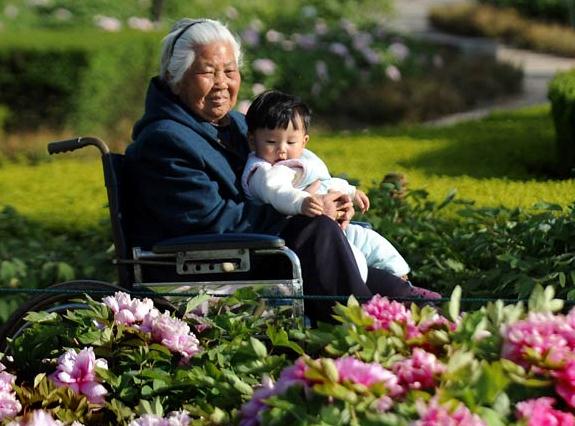

An elderly woman and her granddaughter in a park in Luoyang, Henan province. WANG SONG / XINHUA
Before her daughter gave birth, the farthest Chen Zhijuan had ever been from her home in Siping, a small city in Northeast China's Jilin province, was Dalian in neighboring Liaoning province, about 585 kilometers away.
The 59-year-old never imagined that one day she would settle in Shenzhen, Guangdong province, thousands of kilometers away in South China. She remembers she was so nervous during the flight - her first time on a plane - that she couldn't let go of the armrest on her seat.
Although Chen has lived in the coastal city for three years, taking care of her granddaughter, she doesn't have any close friends, and still feels like an outsider.
To adapt to her new life, Chen attempted to change many of the habits she'd formed over half a century, but her efforts were fruitless. She's grown inured to complaints that she uses too much oil and salt in her cooking, even though she had previously won acclaim for her skill in the kitchen, and she's toned down her strong northeastern accent for fear her granddaughter will copy it and be looked down on by the southerners. She's also learned to bear the loneliness of her new home where people speak with an accent she doesn't understand.
"I thought that the longer I lived, the better things would be, but it's not true. I'm homesick, and long to see my relatives and friends more than ever," she said.
Chen's one source of joy comes from watching her granddaughter grow up, but it's cold comfort in the face of so many problems.
Her husband passed away in 2011 and she longs for someone to talk with, but her everyday exchanges with her daughter and son-in-law are limited.
"They work hard and often come home late. Generally, they go straight to their bedroom. I can read their tiredness on their faces. I want to go home, but my daughter objects fiercely," she said.
Recently, her hair has started to fall out, and she has insomnia. When her daughter took her to the hospital, the doctor said Chen is depressed and needs treatment.
'Old newcomers'
With society becoming increasingly competitive, a greater number of young people are leaving home, seeking job opportunities in the cities. They marry, settle down and start families. That movement has also affected a large number of older people, who have abandoned their dreams of retirement and moved to the cities to care for their grandchildren.
A recent survey shows that China has about 144 million people aged 60 or older, and "old newcomers" - the name given to those who leave home to take care of their children's children - account for 10 percent of them. Increased mobility and the rise in the elderly population means the number will be much higher in the future.
"It looks like a heartwarming picture, three generations of the same family living happily under one roof, but many older people are encountering loneliness and have problems establishing new social relationships in strange places," Zhang Jiming, a senior psychologist at Beijing Normal University, said.
The severing of personal relationships, a shrinking social network, unfamiliar food, and the language differences between north and south all contribute to this anxiety, he said.
"Compared with the young, older people take far longer to become attuned to new environments and gain a sense of security and mental ease. It's not easy for them to change old habits and build new relationships," he added.
Copyright ©1999-2018
Chinanews.com. All rights reserved.
Reproduction in whole or in part without permission is prohibited.